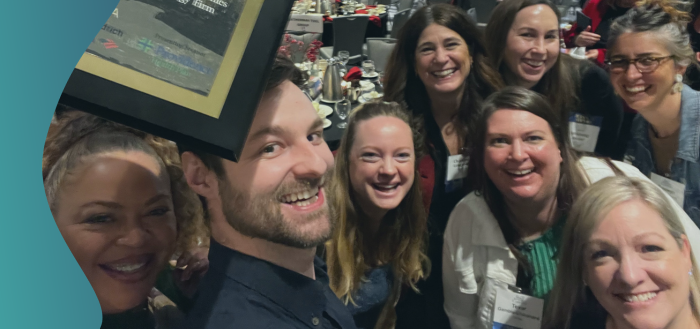August 27, 2020
At Maple City Health Care Center in Goshen, Indiana, any orthodox ideas about the role a health care center should play in its community are being challenged and redefined to advance equity.
“We are a peace and justice organization involved in community development, whose entry point for making a difference in this community, and this neighborhood, is through health care,” said James Gingerich. Dr. Gingerich serves as the health center’s Guardian of Vision (CEO).
Dr. Gingerich founded Maple City Health Care Center (MCHCC) in 1989, after deciding with his wife, Barbara, to settle in the community that became home after the completion of his medical degree. Since that time, MCHCC has earned several national and community awards for its positive impact—fostering a healthier community through a commitment to clinical excellence, workforce innovation, and diverse community representation and engagement.
Working Inclusively to Improve Health Outcomes
MCHCC designed its mission and operating principles with the goal of helping to foster a community that invests in its collective wellbeing. In one instance, a Hispanic couple made food and hosted a dinner for the physicians and support staff who had helped them through a stressful time. The meal turned the tables on perceptions of who was serving whom and underscored the mutual benefit of giving and receiving in a healthy community.
Gingerich sees that a holistic approach to patient engagement, grounded in relationships of trust between patients and health center staff, results in high-quality care. One measure of quality is MCHCC’s completion rate for child weight screenings, currently at about 94 percent. Depression screenings, mammograms, pap smears, childhood vaccinations, and colorectal screenings are all above 80 percent, among the highest completion rates in Indiana. Today, MCHCC is one of OCHIN’s top performing clinics nationally.
“All of this really is not about technique or simply trying to drive data,” Gingerich said. “For us, it’s a matter of organizational culture. It’s a matter of being clear about who we are and what we’re about, and then we see the positive outcomes that stem from this culture of abundance, integration, and inclusion.”
Strengthening a Diverse Workforce
Another area where MCHCC is committed to deepening its cultural ties with the community is through diverse and inclusive hiring practices. According to Gingerich, passion and commitment to MCHCC’s values are more important than field experience. Many of the center’s new hires come from among its dedicated, long-time patients. This focus on hiring local talent enables the center to serve its 70 percent Latino patient population with a 50 percent Latino staff, who provide bilingual services and receive a range of intercultural benefits.
“Our goal is not to extract maximum productivity out of our staff,” Gingerich said. “Our goal is to recruit employees with a shared sense of vision and mission, and then to work at maximizing their potential for our shared benefit.”
Fair pay, access to affordable health care, and educational support are also important investments that MCHCC makes in its staff and their families, in order to reduce social inequalities and increase “abundance” in the community at large.
“It’s really hard to raise a family on what a receptionist typically makes,” Gingerich said. “So, our receptionists get paid well above market rate, because it is important to us that they be able to raise a family.”
MCHCC ensures that every employee earns a living wage, has health insurance, and can receive free care at the health center. The center also helps employees pay off their educational debts as they come due and provides a $5,000 educational stipend for employees’ children each year that they attend college. The center provides a similar college stipend for children who have attended the neighborhood elementary school. Gingerich’s goal is to set an example in the community by investing equally in his staff and in Goshen’s future.
Transforming Board Governance
Underpinning much of MCHCC’s success in everything from improving patients’ health outcomes to high staff retention, is a willingness to make changes that empower the community by putting people first.
In its early years, 90 percent of the health center’s board was made up of patients, many of them low-income Goshen residents. That changed as the center grew, until the center’s leadership team realized that the MCHCC board no longer reflected the diversity of the community it served. The center made changes to the board’s governance, expanding the number of seats and recruiting new members from outside of what had become a mostly middle-class membership. From there, the board transformed its agenda as well. Each two-hour meeting now begins with personal stories and sharing, before discussion of policies or budget. The stories foster trust, and trust results in efficient and effective teamwork.
“We pay a lot of attention to stories because we want them to ground us in our past,” Gingerich said. “We want to tell stories to build trust with each other in the present to do the shared work. And then we want to move into a shared future with a shared story.”













